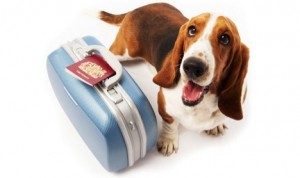 Taking a pet along on a trip can make the family vacation more fun for everyone, if planned carefully. Here are some trip tips to make traveling with a dog enjoyable.
Taking a pet along on a trip can make the family vacation more fun for everyone, if planned carefully. Here are some trip tips to make traveling with a dog enjoyable.
While cats rarely appreciate displacement, most dogs love to accompany owners on vacation. However, traveling with animals must be carefully planned since changing climates and environmental differences can cause stress and affect the health of the animal. Border crossing procedures, possible disease risks in foreign countries, and legalities should also be explored.
Travel by car
Dogs are best kept in a crate for car and airline travel. Available at pet supply stores, crates can keep pets from getting into trouble in a hotel or at a host’s home. Freely moving pets can affect the driver and thus indirectly cause accidents.
To avoid car sickness, feed pets very little before a trip and provide fresh water regularly. Check that the animal gets enough fresh air, but avoid drafts that can lead to eye infections. Consider taking a break every two hours. Heat is the main enemy while driving: Never leave a pet alone in the car since the heat can be deadly.
Travel by plane
Some airlines allow small dogs to fly in the cabin under the seat in a carrier or crate. Larger dogs are transported in a special crate in the cargo area. Most airlines only allow a certain number of dogs on the same flight, so flights should be booked in advance.
Dogs with shortness of breath, heart problems or other health disorders, or dogs who are old or weak, shouldn’t be transported by plane. The pressure, temperature and oxygen levels in the cargo area are subject to change, which can be fatal for these animals.
Be careful with tranquilizers. Many cause a drop in blood pressure, which can be dangerous in the lower pressure of the cargo space. If sedatives are used, pet owners should note the name, dosage and time of administration.
Health and safety
Stray dogs, ticks and mosquitoes often transmit diseases. Pets traveling to warmer and more humid climates may develop parasitic or bacterial diseases such as babesiosis, leishmaniasis, ehrlichiosis and dirofilariasis (heartworm). These diseases can have very serious consequences or can even be fatal. Pet owners should use sufficient bug repellant to protect animals from ticks and mosquitos.
If it turns out the pet would be better off boarded in a kennel while on vacation, reserve space well in advance. During peak tourist seasons the kennels are often sold out ahead of time. Clarify what vaccinations your pet needs for kennel stay. When you entrust your pet to a friend or a sitter, allow enough time for them to get to know each other.






Speak Your Mind